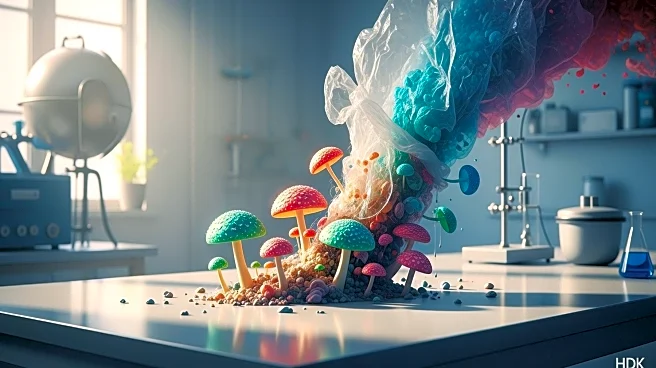What is the story about?
What's Happening?
Engineers at the German startup Biophelion have developed a method using the black fungus Aureobasidium pullulans to decompose and convert plastic waste into useful compounds. This process not only breaks down plastic but also consumes leftover carbon dioxide, preventing its release into the atmosphere. The initiative is part of the 'Circular Biomanufacturing Challenge' organized by Germany's Federal Agency for Breakthrough Innovations SPRIND. The fungus transforms industrial byproducts into three key compounds: pullulan, a tasteless edible polymer used in food production; a polyester suitable for plastic packaging; and a surfactant molecule intended for use in 3D printing. The startup aims to bridge the gap between academic research and industrial implementation, offering a sustainable solution to plastic pollution.
Why It's Important?
This development is significant as it presents a sustainable method to tackle plastic pollution, a major environmental issue. By converting plastic waste into edible and useful materials, the process could reduce reliance on traditional plastic production and decrease environmental impact. The use of pullulan and other compounds in various industries could lead to more sustainable practices and products. Additionally, the method's ability to consume carbon dioxide during the process addresses another critical environmental concern, potentially contributing to efforts against climate change.
What's Next?
Biophelion plans to further explore the applications of pullulan and the surfactant molecule, aiming to expand their use in industries beyond food production and 3D printing. The startup is focused on developing new applications that are not yet conceivable today, breaking new ground in material science. As the technology progresses, it could lead to broader industrial adoption and significant reductions in plastic waste.
Beyond the Headlines
The use of fungi in biomanufacturing highlights the potential of natural organisms in solving complex environmental problems. This approach could inspire further research into other biological solutions for pollution and resource management. The success of Biophelion's method may encourage more startups and researchers to explore similar sustainable technologies, fostering innovation in the field of environmental science.















